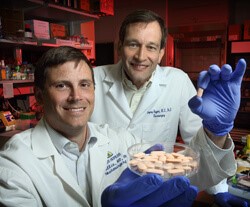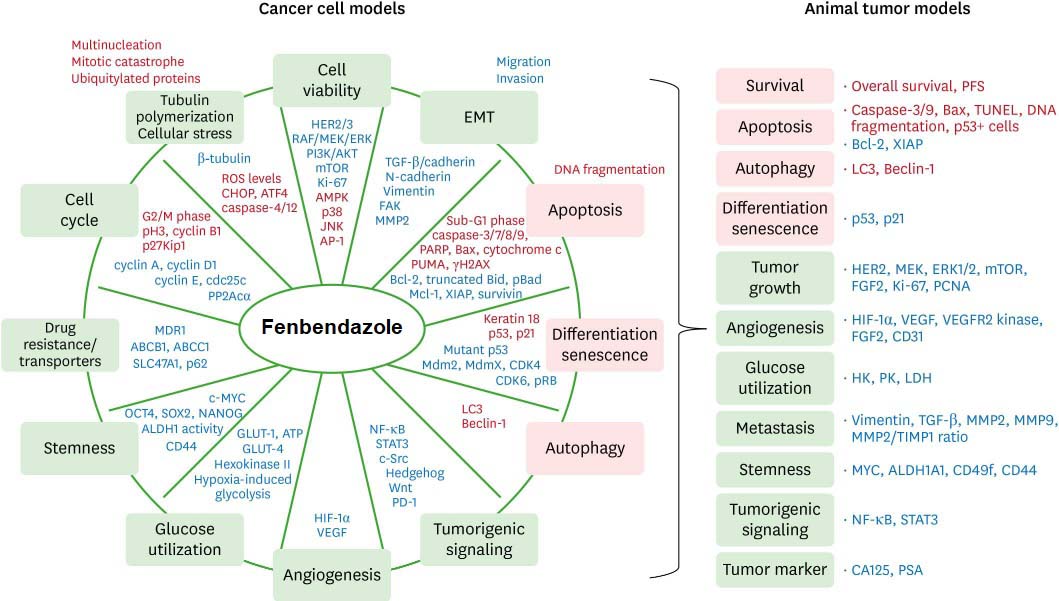
In most of the cases, the researcher and his colleagues had no trouble inducing glioblastoma brain cancer in experimental rodents.
However, one day they encountered a group of mice that had failed to develop any tumors.
The researchers investigated the possible cause of this interesting event and found out that the mice were pre-treated with a veterinary anthelmintic medication – fenbendazole.
This accidental discovery led the scientists in directing more studies towards the anticancer effect of fenbendazole and other benzimidazole compounds such as mebendazole, albendazole, niclosamide and ivermectin. (Source)
A similar story also happened earlier in 2008. A group of researchers were investigating human lymphoma treatment in laboratory mice. Surprisingly, a fenbendazole pre-treated group of rodents failed to grow experimentally induced lymphoma xenografts. Later, the study showed that fenbendazole significantly inhibited tumor growth. (Source)
These findings meant that fenbendazole could fit in anticancer therapy as a single agent or in combination with various tumor treatment regimens. It could also serve as an additional measure to surgery, radiotherapy, chemotherapy, or prophylaxis.
According to scientists, fenbendazole has a high safety margin and most of the animals as well as humans tolerate this substance quite well. Previous safety studies in laboratory rodents have shown that this de-worming drug has a high degree of safety and a low toxicity risk.
In the last decade, fenbendazole has gained popularity all over the world as one of the available choices in helping cancer patients. Nevertheless, the data on fenbendazole efficacy is quite scarce as the drug is already widely available, has an expired patent and pharmaceutical companies couldn’t make profit from additional research. Therefore, no large investors have appeared to be making further steps in uncovering the information on how fenbendazole could be applied in everyday practice to keep cancer at bay.
Currently, people are openly sharing their experiences related to this old medication and its use in their journey against cancer. Luckily, there is sufficient toxicological and pre-clinical data that can guide those willing to try this veterinary drug out on how to take it safely as well as how it could aid in cancer treatment.
Ultimately, only additional clinical studies could finally answer the main questions on how this compound could be incorporated into clinical practice to serve those in need.

Dr. Gregory Riggins lab at John Hopkins was known for researching gene mutations that cause cancer as well as for developing new medications in the preclinical setting before suggesting them for further clinical trials.
In most of the cases, the researcher and his colleagues had no trouble inducing glioblastoma brain cancer in experimental rodents.
However, one day they encountered a group of mice that had failed to develop any tumors.
The researchers investigated the possible cause of this interesting event and found out that the mice were pre-treated with a veterinary anthelmintic medication – fenbendazole.
This accidental discovery led the scientists in directing more studies towards the anticancer effect of fenbendazole and other benzimidazole compounds such as mebendazole, albendazole, niclosamide and ivermectin. (Source)
A similar story also happened earlier in 2008. A group of researchers were investigating human lymphoma treatment in laboratory mice. Surprisingly, a fenbendazole pre-treated group of rodents failed to grow experimentally induced lymphoma xenografts. Later, the study showed that fenbendazole significantly inhibited tumor growth. (Source)

These findings meant that fenbendazole could fit in anticancer therapy as a single agent or in combination with various tumor treatment regimens. It could also serve as an additional measure to surgery, radiotherapy, chemotherapy, or prophylaxis.
According to scientists, fenbendazole has a high safety margin and most of the animals as well as humans tolerate this substance quite well. Previous safety studies in laboratory rodents have shown that this de-worming drug has a high degree of safety and a low toxicity risk.
In the last decade, fenbendazole has gained popularity all over the world as one of the available choices in helping cancer patients. Nevertheless, the data on fenbendazole efficacy is quite scarce as the drug is already widely available, has an expired patent and pharmaceutical companies couldn’t make profit from additional research. Therefore, no large investors have appeared to be making further steps in uncovering the information on how fenbendazole could be applied in everyday practice to keep cancer at bay.
Currently, people are openly sharing their experiences related to this old medication and its use in their journey against cancer. Luckily, there is sufficient toxicological and pre-clinical data that can guide those willing to try this veterinary drug out on how to take it safely as well as how it could aid in cancer treatment.
Ultimately, only additional clinical studies could finally answer the main questions on how this compound could be incorporated into clinical practice to serve those in need.
